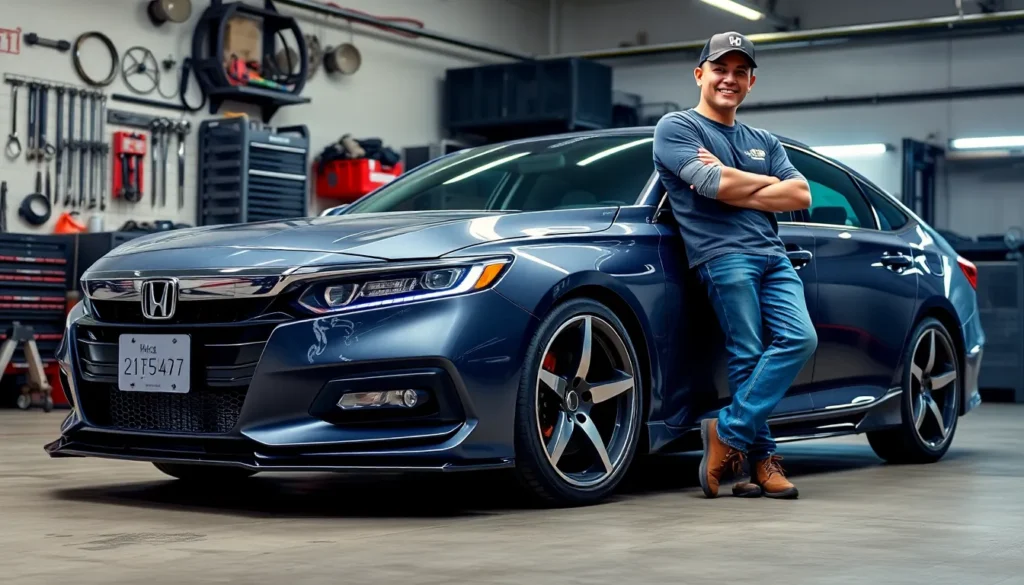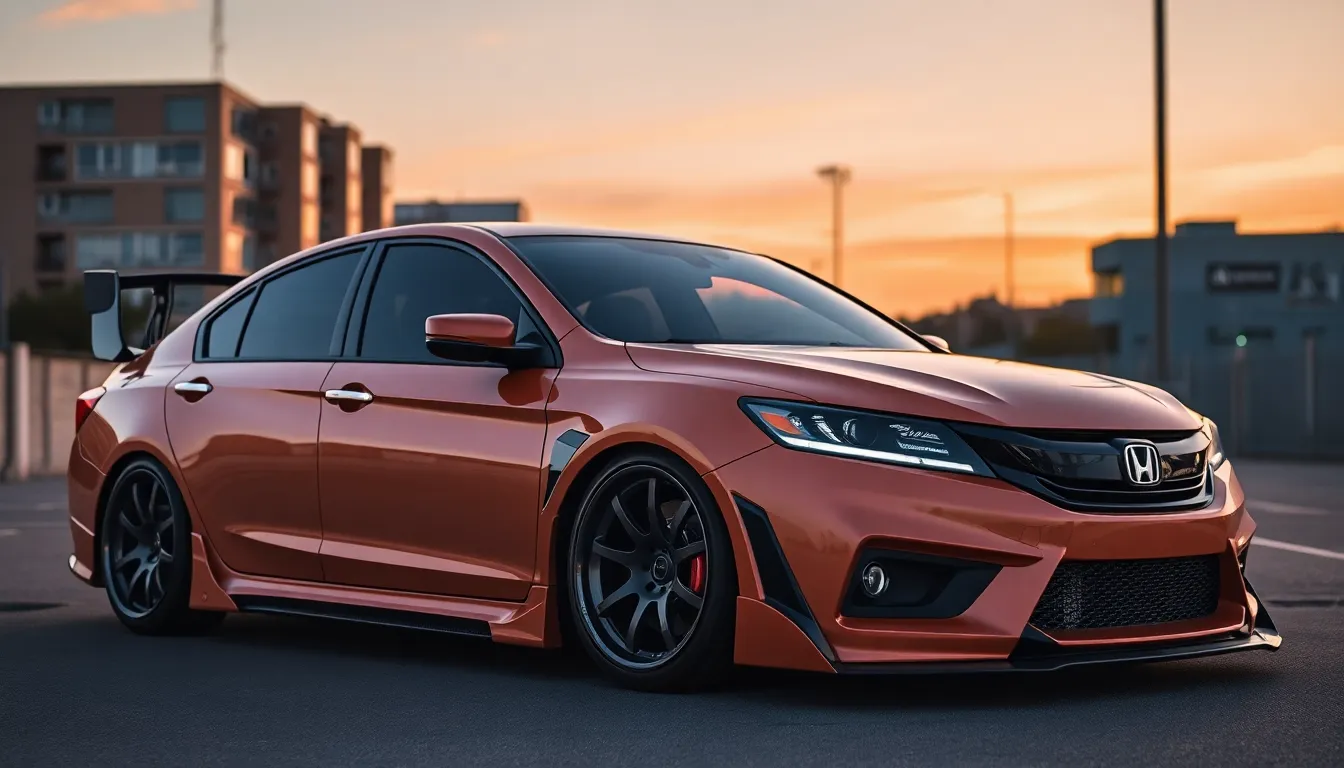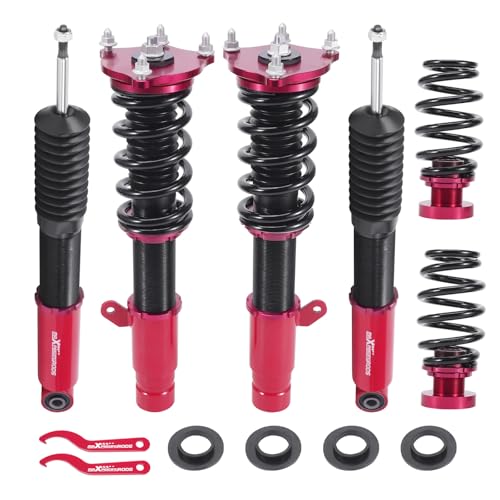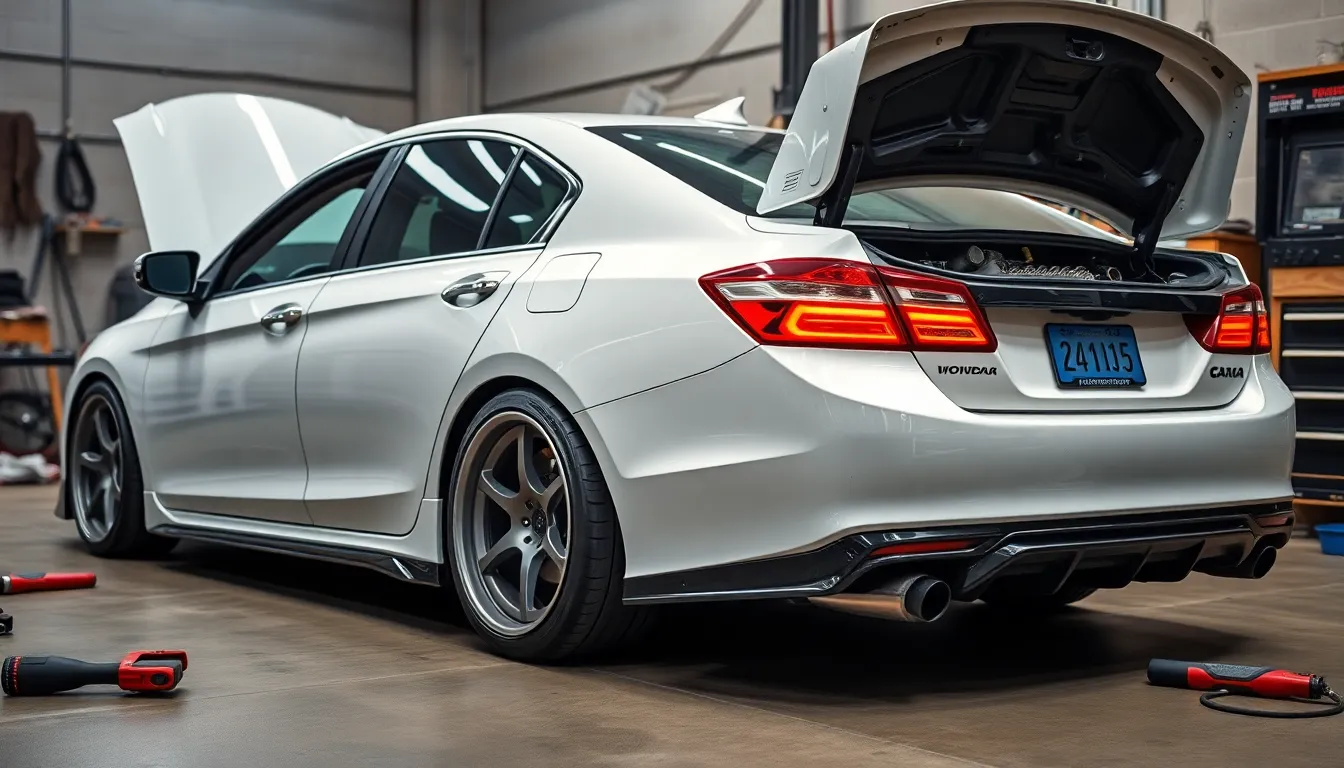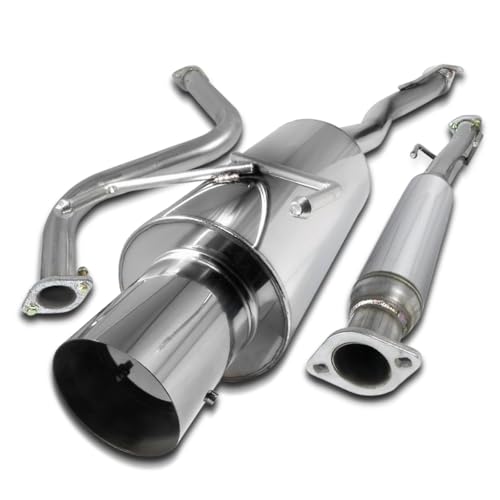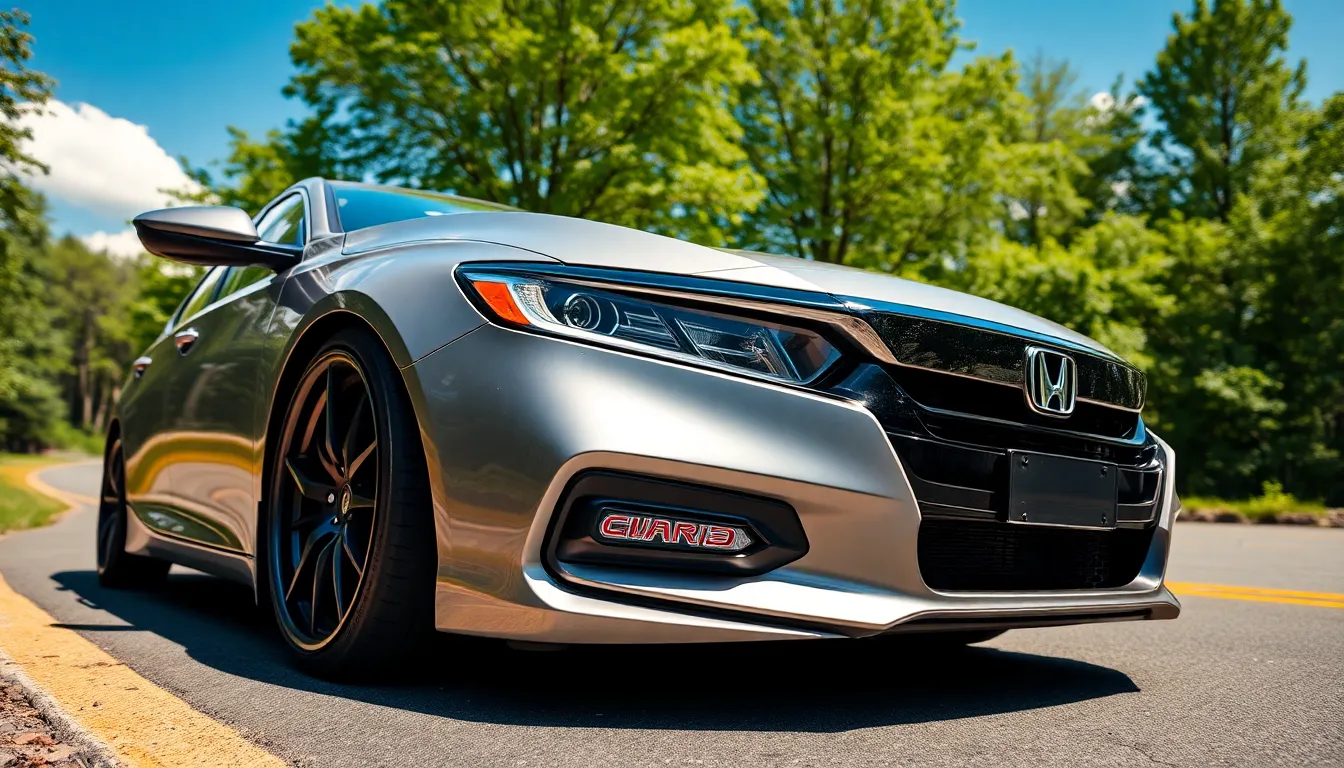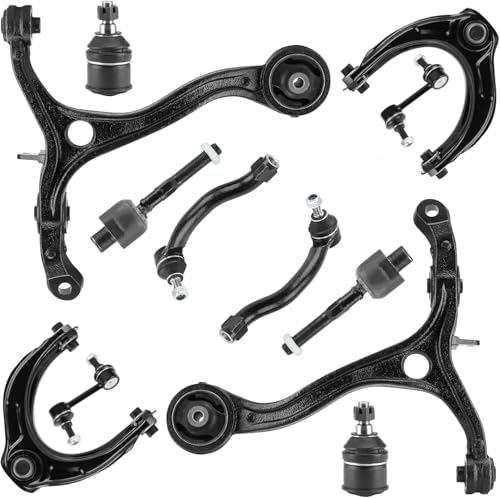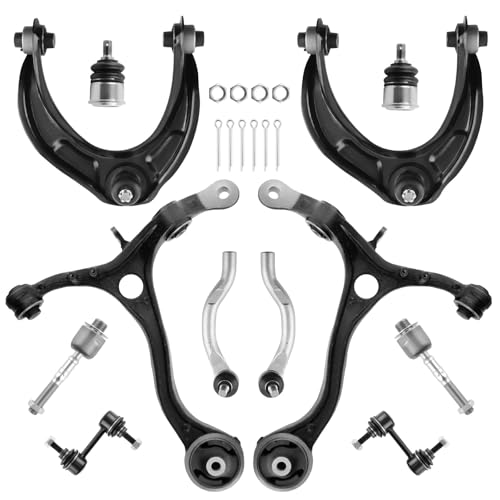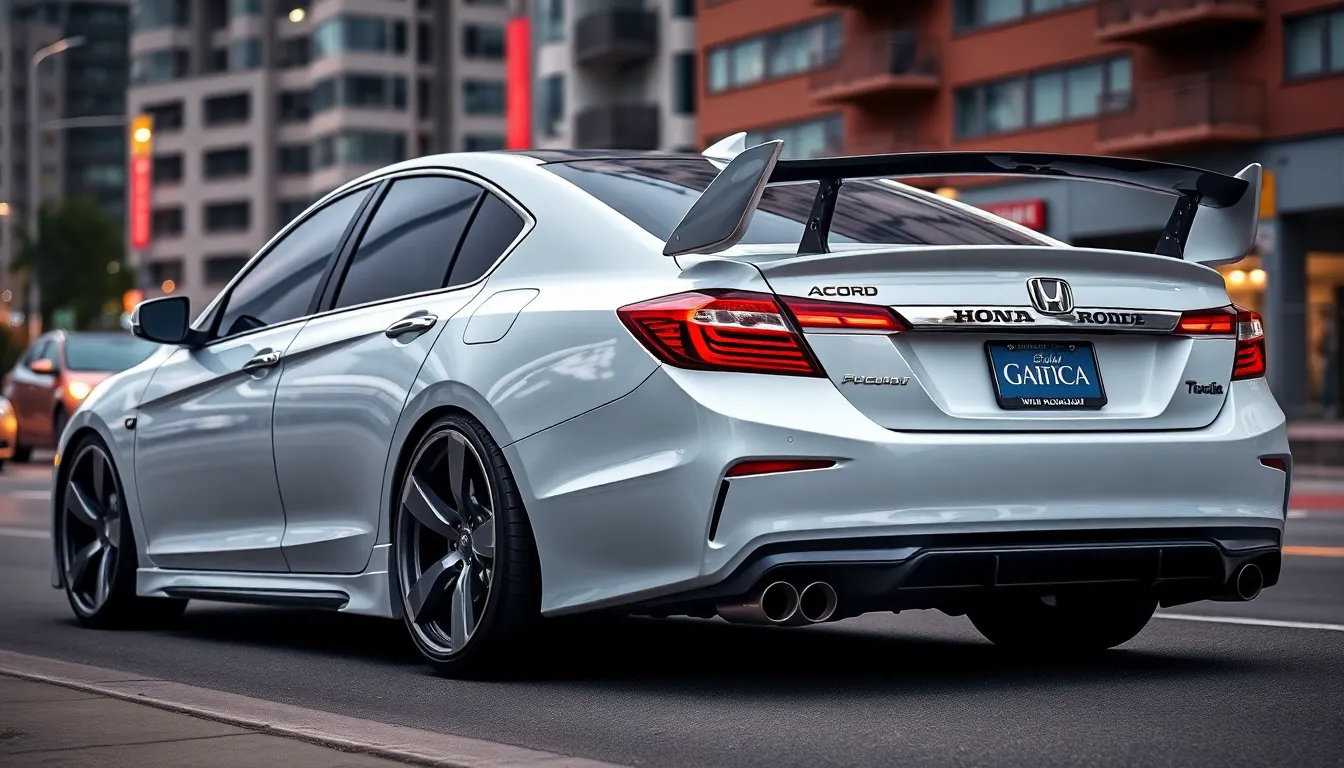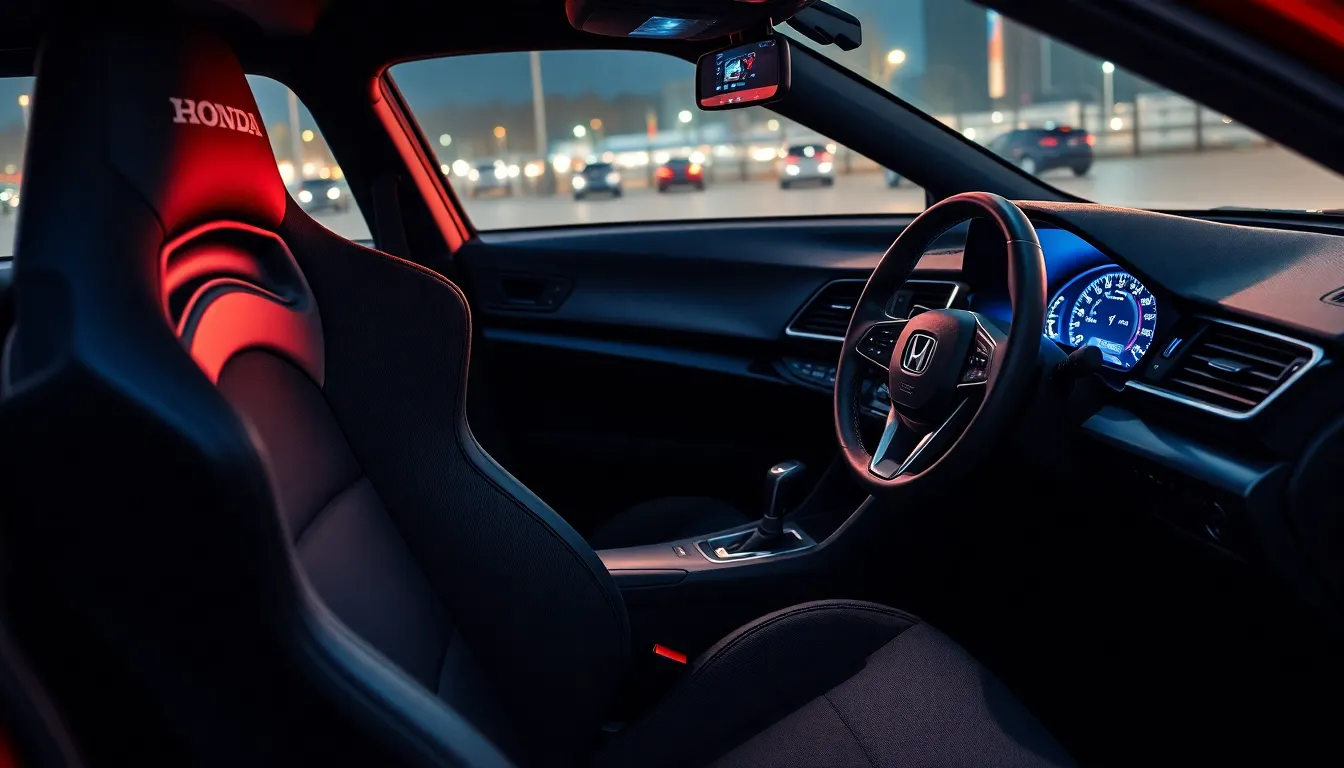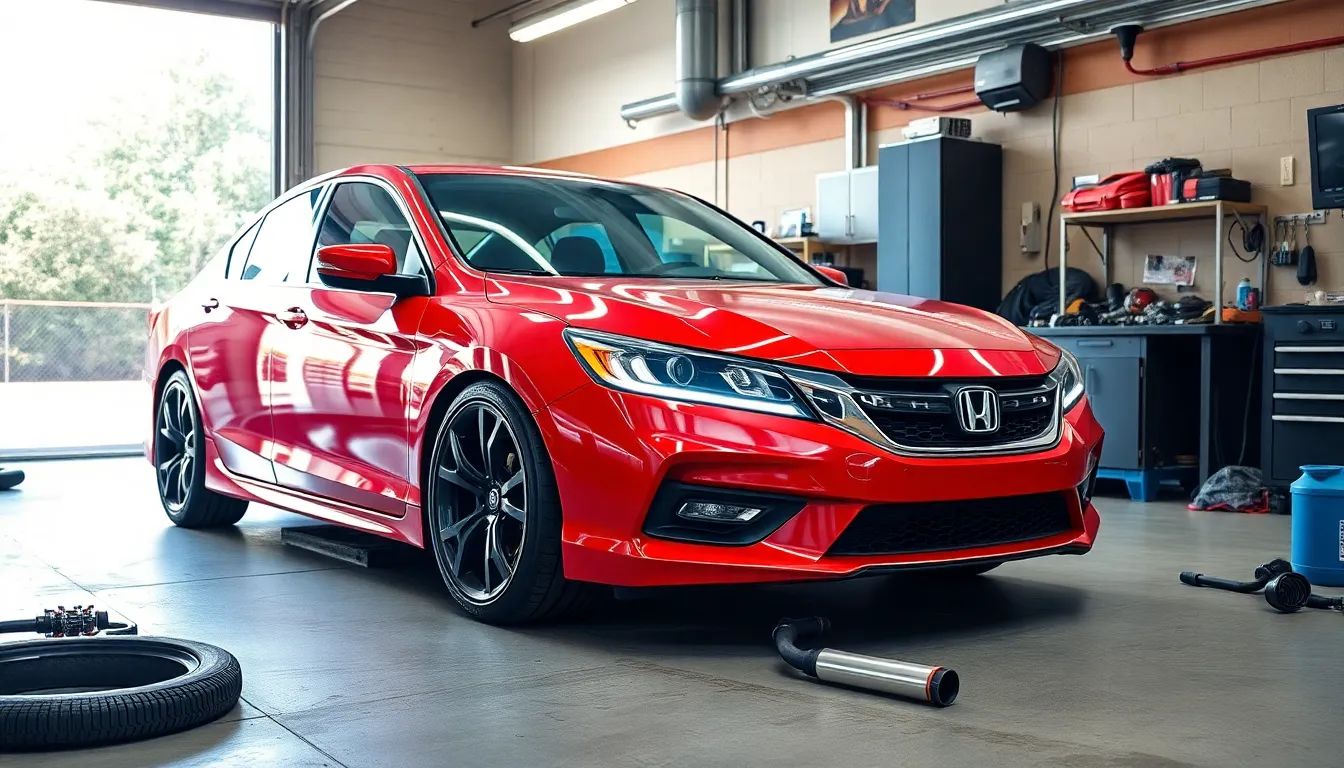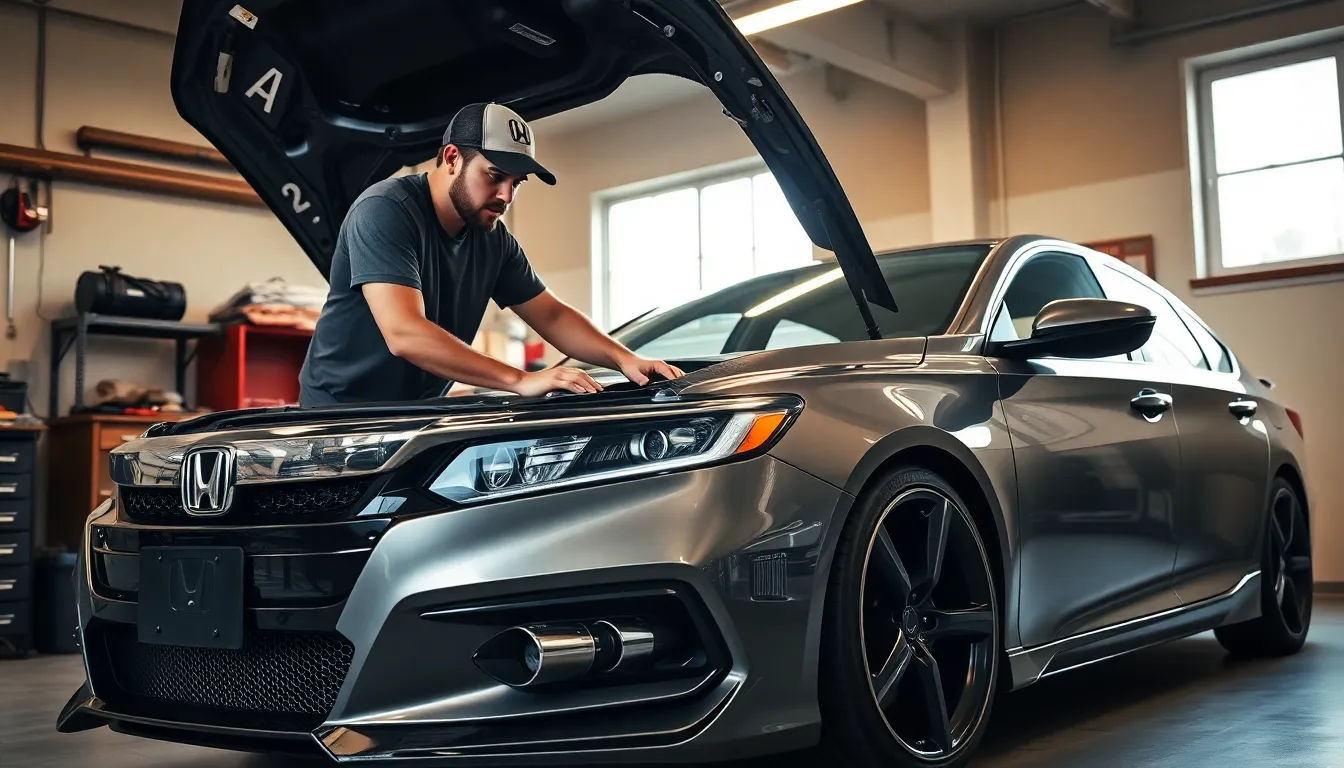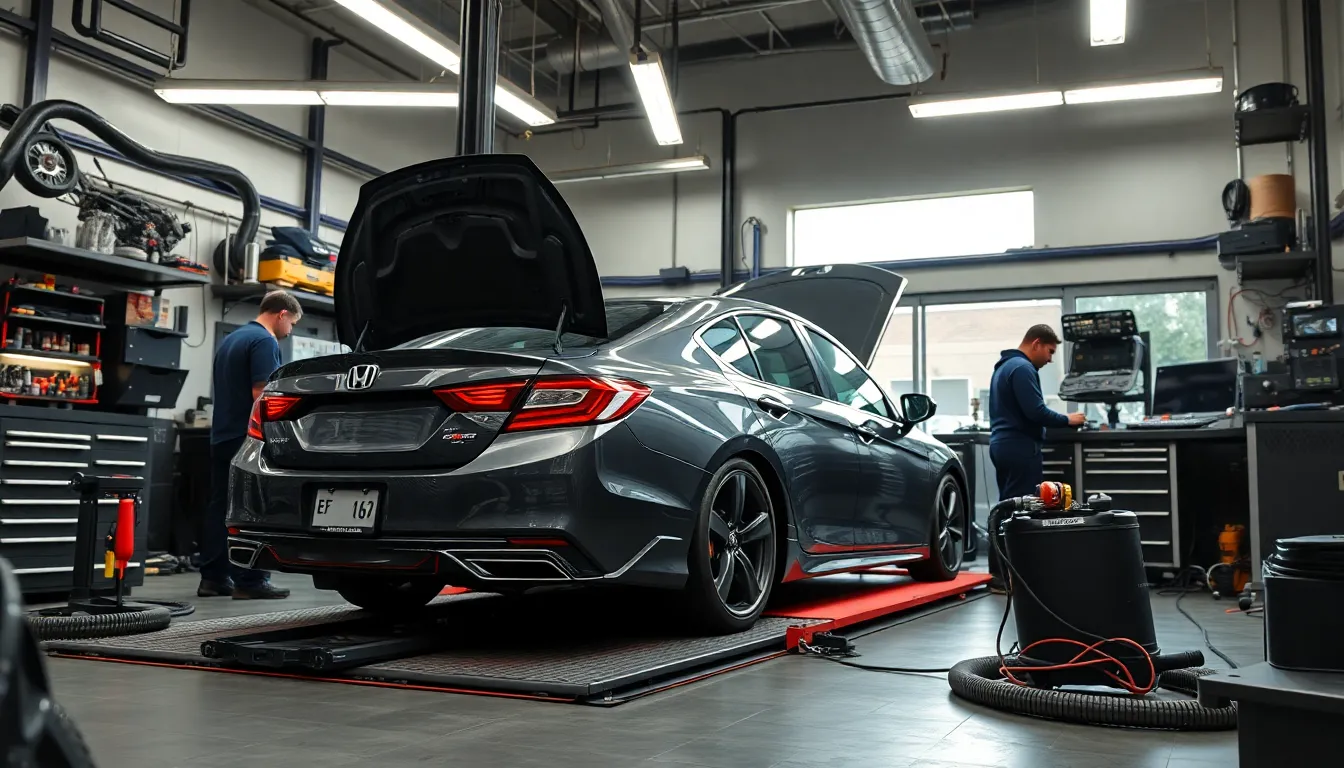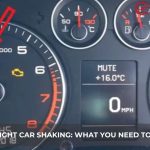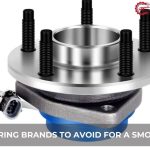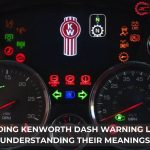We’ve all seen that sleek Honda Accord cruising down the highway and wondered what it would look like with some serious modifications. The Honda Accord isn’t just a reliable family sedan – it’s a tuning goldmine waiting to be unleashed. With its robust engine platform and aftermarket support that rivals sports cars, the Accord offers endless possibilities for performance enthusiasts and style seekers alike.
Whether you’re looking to squeeze every ounce of horsepower from your K-series engine or transform your Accord’s appearance with aggressive body kits and lowered suspension, we’re here to guide you through the exciting industry of Accord tuning. From budget-friendly bolt-on modifications to comprehensive engine builds, there’s a tuning path for every skill level and wallet size.
Ready to turn your daily driver into a head-turning performance machine? Let’s explore the most effective Honda Accord tuning modifications that’ll have you dominating both the streets and the track.
What Is Honda Accord Tuning?
Honda Accord tuning represents the systematic modification of engine, suspension, exhaust, and aesthetic components to enhance performance, handling, and visual appeal beyond factory specifications. We define this process as the strategic application of aftermarket parts and professional calibration techniques that unlock the hidden potential within the Accord’s well-engineered platform.
Tuning encompasses multiple modification categories that transform the sedan’s capabilities. Engine tuning involves ECU remapping, cold air intake systems, turbocharger upgrades, and internal engine component replacements to increase horsepower and torque output. Suspension tuning includes coilover installations, strut tower braces, and anti-roll bar upgrades that improve cornering stability and reduce body roll during aggressive driving. Exhaust system modifications feature cat-back systems, headers, and downpipes that enhance sound characteristics while improving exhaust flow efficiency.
Modern Honda Accord generations from 2008 to 2024 offer distinct tuning advantages across their engine configurations. The 2.0L turbocharged K20C1 engine in tenth-generation models responds exceptionally well to ECU tuning, producing gains of 40-60 horsepower with basic modifications. Earlier 3.5L V6 engines in eighth and ninth-generation Accords deliver substantial power increases through intake and exhaust upgrades combined with professional engine management tuning.
| Generation | Engine Options | Common Power Gains | Popular Modifications |
|---|---|---|---|
| 8th Gen (2008-2012) | 2.4L I4, 3.5L V6 | 25-45 HP | Cold air intake, exhaust, ECU tune |
| 9th Gen (2013-2017) | 2.4L I4, 3.5L V6 | 30-50 HP | Turbo kit, suspension, wheels |
| 10th Gen (2018-2024) | 1.5L Turbo, 2.0L Turbo | 40-80 HP | Downpipe, intercooler, tune |
Professional tuning shops use dynamometer testing to measure baseline performance before implementing modifications. We recommend this approach because it provides accurate power measurements and ensures optimal air-fuel ratios throughout the modification process. Advanced tuning techniques include forced induction installations, internal engine builds with forged components, and comprehensive suspension geometry adjustments that transform the Accord into a formidable performance machine.
Visual modifications complement performance upgrades through body kit installations, wheel and tire packages, and interior enhancements. These aesthetic improvements create a cohesive appearance that reflects the enhanced performance capabilities while maintaining the Accord’s refined character that appeals to daily driving scenarios.
Popular Honda Accord Generations for Tuning
Certain Honda Accord generations stand out as exceptional platforms for performance modifications. Each generation offers distinct advantages that appeal to different types of tuning enthusiasts.
6th Generation (1998-2002)
The 6th generation Accord provides an excellent entry point for budget-conscious tuning projects with its lightweight chassis and reliable F-series engines. This generation features the F23A1 2.3L SOHC engine producing 150 horsepower and the F23A4 VTEC variant generating 170 horsepower.
Key tuning advantages include:
- Abundant aftermarket support with parts priced 40-60% lower than newer generations
- Simple OBD-II engine management allowing for easier ECU modifications
- Lightweight construction at approximately 3,100 pounds improving power-to-weight ratios
- Strong transmission options including the 5-speed manual and reliable automatic variants
Popular modifications focus on cold air intakes producing 8-12 horsepower gains, cat-back exhaust systems adding 10-15 horsepower, and suspension lowering springs reducing ride height by 1.5-2 inches. The generation’s affordability makes it ideal for first-time tuners learning modification fundamentals.
7th Generation (2003-2007)
Seventh generation Accords represent the sweet spot for serious Honda tuning with their refined K-series engines and improved chassis dynamics. The K24A4 2.4L i-VTEC engine delivers 160-166 horsepower while maintaining excellent reliability under moderate modifications.
Notable tuning characteristics:
- Advanced i-VTEC system responding well to ECU tuning with gains of 15-25 horsepower
- Strengthened engine internals supporting forced induction applications up to 300 horsepower
- Improved suspension geometry accepting coilover systems and performance upgrades seamlessly
- Enhanced aerodynamics package options including factory-inspired body kits
Turbocharger kits specifically designed for the K24A4 engine produce 80-120 horsepower increases when paired with supporting modifications. Suspension upgrades utilizing coilovers and performance shocks transform the handling characteristics while maintaining daily drivability.
8th Generation (2008-2012)
The 8th generation Accord offers modern performance capabilities with its advanced K-series engines and refined chassis engineering. Both the K24Z3 2.4L and J35Z6 3.5L V6 engines provide substantial tuning potential for different performance goals.
Performance specifications:
| Engine | Stock HP | Tuned HP Potential | Popular Modifications |
|---|---|---|---|
| K24Z3 2.4L | 177-190 | 220-280 | Turbo kits, ECU tuning |
| J35Z6 3.5L | 268-271 | 320-380 | Cold air intake, exhaust |
The generation’s drive-by-wire throttle system integrates well with modern tuning answers including Hondata FlashPro and KTuner systems. Forced induction becomes more accessible through bolt-on turbo kits producing reliable power increases of 60-100 horsepower.
Advanced suspension systems featuring electronically controlled dampers in certain trims accept performance modifications while retaining comfort settings for daily driving scenarios.
9th Generation (2013-2017)
Ninth generation Accords represent the most technologically advanced platform for Honda tuning with sophisticated engine management and refined powertrains. The Earth Dreams K24W1 2.4L and J35Y6 3.5L engines incorporate direct injection and advanced VTEC systems.
Modern tuning advantages:
- Direct injection system responding to ECU calibration changes with 20-35 horsepower gains
- CVT transmission models accepting performance tuning through specialized software
- Advanced chassis construction supporting aggressive suspension modifications
- Comprehensive factory performance monitoring systems aiding in modification tracking
ECU tuning through Hondata FlashPro systems unlocks important performance potential with gains reaching 25-40 horsepower on naturally aspirated engines. The generation’s sophisticated emissions systems require careful consideration during modification planning to maintain compliance.
Aerodynamic enhancements integrate seamlessly with the generation’s modern styling while functional upgrades like front splitters and rear spoilers provide measurable downforce improvements at highway speeds.
Engine Performance Modifications
Engine performance modifications form the foundation of Honda Accord tuning projects. These upgrades deliver measurable power gains while maintaining the vehicle’s reliability and drivability characteristics.
Cold Air Intakes and Exhaust Systems
Cold air intake systems replace restrictive factory airboxes with high-flow filters and intake tubes that draw cooler air from outside the engine bay. Installing a quality cold air intake system typically produces 5-15 horsepower gains on naturally aspirated Accord engines, with K-series engines responding particularly well to these modifications. Popular brands like AEM, Injen, and K&N offer direct-fit systems that install in 30-60 minutes using basic hand tools.
Cat-back exhaust systems enhance performance by reducing backpressure and improving exhaust flow throughout the system. We recommend mandrel-bent stainless steel systems that maintain consistent diameter throughout all pipe sections for optimal flow characteristics. Complete cat-back systems from manufacturers like Borla, Magnaflow, and HKS typically add 8-20 horsepower while producing a deeper exhaust note.
Header upgrades maximize gains when combined with cat-back systems by replacing restrictive factory manifolds with free-flowing designs. Aftermarket headers from DC Sports, Skunk2, and Weapon-R can add an additional 10-25 horsepower when paired with complementary exhaust modifications. Installing headers requires more advanced mechanical skills and may affect emissions compliance in certain states.
ECU Tuning and Chip Upgrades
ECU tuning optimizes engine parameters like fuel delivery, ignition timing, and boost pressure to extract maximum performance from existing hardware modifications. Professional tuning typically increases power output by 15-40 horsepower on naturally aspirated engines when combined with supporting modifications like intakes and exhaust systems.
Hondata FlashPro systems provide comprehensive tuning answers for K-series engines, allowing real-time parameter adjustments and data logging capabilities. These systems cost approximately $695 and require laptop connectivity for programming custom tune files. Professional tuning shops charge $400-800 for dyno tuning sessions that optimize performance across the entire RPM range.
Ktuner systems offer similar functionality with user-friendly interfaces and extensive support for various Accord generations. These plug-and-play devices connect to the OBD-II port and modify factory ECU programming without permanent hardware changes. Remote tuning services allow experienced tuners to optimize performance using datalog files, reducing costs compared to in-person dyno sessions.
Turbocharger and Supercharger Kits
Turbocharger kits deliver the most substantial power increases available for Honda Accord engines, with complete systems typically producing 100-300 additional horsepower depending on boost levels and supporting modifications. Full Spectrum Performance, Full Race, and Garrett Motion offer comprehensive turbo kits specifically designed for K-series engines.
Complete turbocharger systems include custom manifolds, intercoolers, piping, blow-off valves, and all necessary hardware for installation. Installation costs range from $3,000-6,000 at professional shops, with kit prices starting around $4,500 for basic setups. Supporting modifications like upgraded fuel systems, clutches, and engine internals become necessary at higher power levels.
Supercharger kits provide immediate throttle response without turbo lag, making them ideal for daily driving applications. Jackson Racing and Kraftwerks manufacture bolt-on supercharger systems that typically produce 50-100 additional horsepower with conservative tuning. These systems maintain better low-end torque characteristics compared to turbocharger setups while requiring fewer supporting modifications for reliable operation.
Suspension and Handling Upgrades
Suspension modifications complement engine tuning by transforming the Accord’s handling characteristics and reducing body roll during cornering. These upgrades create a balanced performance platform that maximizes the benefits of increased power output.
Coilovers and Lowering Springs
Coilovers provide the ultimate suspension upgrade for Honda Accord tuning enthusiasts seeking precise height adjustment and damping control. Quality coilover systems from manufacturers like BC Racing and Tein offer 1-3 inch drop capabilities while maintaining daily drivability. These systems typically cost $800-2500 and include adjustable damping rates that allow customization for track days or street driving.
Lowering springs present a budget-friendly alternative that reduces ride height by 1.5-2.5 inches while improving handling dynamics. Popular spring manufacturers Eibach Pro-Kit and H&R Sport springs cost $200-400 and work with factory struts to lower the center of gravity. Spring rates increase by 20-40% over stock specifications to reduce body roll and improve cornering response.
Performance gains from suspension lowering include reduced aerodynamic drag and improved tire contact patch during cornering maneuvers. Track testing demonstrates lap time improvements of 2-5 seconds on road courses when combining lowering springs with performance tires. Installation requires professional alignment to optimize suspension geometry and prevent premature tire wear.
Sway Bars and Strut Braces
Sway bars increase chassis stiffness and reduce body roll during aggressive cornering by connecting left and right suspension components. Aftermarket front sway bars typically measure 24-28mm diameter compared to factory 22-24mm bars on most Accord generations. Rear sway bar upgrades range from 18-22mm diameter and provide noticeable improvements in handling balance.
Progress Technology and Hotchkis manufacture complete sway bar kits that cost $300-600 and include polyurethane bushings for reduced deflection. These upgrades reduce body roll by 30-50% during cornering while maintaining acceptable ride quality for daily driving. Installation complexity varies by generation but typically requires 2-4 hours of labor.
Strut tower braces connect the front strut towers to increase chassis rigidity and improve steering response. Upper strut braces cost $100-300 and bolt directly to existing mounting points without modification. Lower chassis braces tie together subframe mounting points and provide additional rigidity for aggressive driving scenarios. Performance benefits include improved steering precision and reduced chassis flex during hard acceleration or braking events.
Exterior and Aesthetic Modifications
Aesthetic modifications transform the Honda Accord’s appearance while complementing performance upgrades. These visual enhancements create a cohesive package that reflects the enhanced capabilities beneath the hood.
Body Kits and Spoilers
Body kits enhance aerodynamic efficiency while creating an aggressive stance that matches performance modifications. Honda Accord owners commonly choose from three distinct styling approaches: OEM-inspired designs maintain factory aesthetics, sport packages add subtle aggressive elements, and full race kits provide maximum visual impact with functional aerodynamic components.
Popular manufacturers offer comprehensive body kit options for different Accord generations. Mugen produces factory-approved aero packages that integrate seamlessly with OEM lines, while companies like Vis Racing and Duraflex provide aggressive styling alternatives. Front lips reduce lift at highway speeds by redirecting airflow under the vehicle, creating downforce that improves stability during high-speed driving.
Side skirts connect front and rear elements while reducing turbulence along the vehicle’s sides. Performance-oriented designs incorporate functional vents that improve brake cooling or engine bay ventilation. Rear spoilers generate measurable downforce at speeds above 60 mph, with wing-style designs providing maximum aerodynamic benefit for track-focused builds.
Material selection impacts both appearance and functionality. Fiberglass offers affordability with good fitment, polyurethane provides flexibility and durability for daily drivers, and carbon fiber delivers weight savings with premium aesthetics. Quality installations require professional painting to match factory colors, with costs ranging from $800 for basic lip kits to $3,500 for complete aero packages.
Wheels and Tires
Wheel and tire combinations dramatically alter the Accord’s stance while improving performance characteristics. Proper sizing ensures optimal fitment without compromising suspension geometry or causing clearance issues with fender wells and brake components.
Popular Honda Accord Wheel Specifications
| Generation | Stock Size | Popular Upgrade | Offset Range | Tire Width |
|---|---|---|---|---|
| 6th Gen | 16×6.5 | 18×8.5 | +45 to +35 | 225-245mm |
| 7th Gen | 17×7 | 19×8.5 | +45 to +35 | 235-255mm |
| 8th Gen | 17×7.5 | 19×9 | +45 to +35 | 245-265mm |
| 9th Gen | 18×8 | 19×9.5 | +50 to +35 | 245-275mm |
Lightweight forged wheels reduce unsprung weight by 15-40 pounds compared to factory castings, improving acceleration and handling response. Brands like Enkei, Work Emotion, and BBS offer designs specifically engineered for Honda applications with proper load ratings and hub bore dimensions.
Tire selection balances performance characteristics with intended use. Summer performance tires like Michelin Pilot Sport 4S or Continental ExtremeContact Sport provide maximum grip for spirited driving. All-season options such as Michelin Pilot Sport A/S 3+ maintain year-round usability while offering improved performance over factory rubber.
Wider tire contact patches increase grip during cornering and braking, with 245mm widths representing the optimal balance for most street applications. Track-focused builds benefit from 255-275mm widths paired with appropriate wheel widths to maintain proper tire sidewall angles. Professional alignment adjustments optimize tire wear patterns and handling characteristics following wheel upgrades.
Interior Performance Enhancements
Interior performance modifications transform the Honda Accord’s cabin into a purpose-built environment that supports serious driving dynamics. Racing seats anchor the most critical upgrade, with brands like Recaro, Bride, and Sparco offering fixed-back designs that provide superior lateral support during aggressive cornering. These seats reduce driver movement by up to 60% compared to factory seating, allowing for more precise steering inputs and consistent pedal application.
Harness systems complement racing seats by distributing crash forces across multiple contact points on the body. Six-point harnesses offer maximum safety for track use, while four-point systems provide adequate protection for spirited street driving. Mount points require reinforcement through the floor pan, with proper installation crucial for both safety and effectiveness.
Steering wheels upgrade the primary interface between driver and machine, with smaller diameter options improving control response. Momo, Sparco, and Personal steering wheels feature reduced diameter designs between 320-350mm that enhance steering precision. Quick-release hubs allow rapid wheel removal for theft deterrence and easier entry in cars equipped with racing seats.
Roll cages provide the ultimate chassis stiffening upgrade while protecting occupants during track sessions. Multi-point cages integrate with the Accord’s unibody structure, increasing overall rigidity by 40-70% depending on design complexity. DOM tubing construction ensures maximum strength with minimal weight addition, typically adding 50-80 pounds to the vehicle’s curb weight.
Gauge clusters monitor critical engine parameters that factory instrumentation often overlooks. Air/fuel ratio gauges track combustion efficiency, while boost gauges display turbocharger pressure in forced induction applications. Oil pressure and water temperature gauges provide early warning of potential mechanical issues during high-performance driving sessions.
Shifter upgrades improve gear change precision and reduce throw length for faster shifts. Short throw shifters like those from Skunk2 and Injen reduce shift travel by 30-40% while maintaining smooth operation. Weighted shift knobs provide additional momentum during gear changes, with proper weight distribution crucial for optimal feel.
Fire suppression systems offer essential safety equipment for track-focused builds. Automatic systems activate during impact or excessive heat, while manual systems allow driver-controlled deployment. Professional installation ensures proper coverage of engine bay and cabin areas where fires typically originate.
Data acquisition systems capture performance metrics for analysis and improvement. Basic systems record lap times and split intervals, while advanced units monitor dozens of parameters including throttle position, brake pressure, and cornering forces. This information guides suspension tuning and driving technique development for consistent lap time improvements.
Cost Considerations for Honda Accord Tuning
Cost considerations for Honda Accord tuning vary dramatically based on modification depth and component quality. Budget builds starting at $2,000-$5,000 focus on bolt-on modifications like cold air intakes ($150-$400), cat-back exhaust systems ($400-$1,200), and lowering springs ($200-$600). Mid-range tuning projects ranging from $5,000-$15,000 incorporate ECU tuning ($500-$800), coilovers ($800-$2,500), and performance headers ($300-$800).
High-end builds exceeding $15,000 include turbocharger kits ($3,000-$8,000), engine internals ($2,000-$6,000), and comprehensive suspension systems ($3,000-$7,000). Professional installation adds 30-50% to parts costs depending on modification complexity and regional labor rates.
| Modification Category | Budget Range | Parts Cost | Labor Cost |
|---|---|---|---|
| Basic Bolt-ons | $1,000-$3,000 | $800-$2,200 | $200-$800 |
| ECU Tuning | $500-$1,500 | $400-$800 | $100-$700 |
| Suspension Upgrade | $1,000-$4,000 | $600-$2,500 | $400-$1,500 |
| Turbo Kit Installation | $4,000-$12,000 | $3,000-$8,000 | $1,000-$4,000 |
Hidden costs emerge through supporting modifications required for reliable power increases. Turbocharger installations demand fuel system upgrades ($800-$2,500), engine management systems ($600-$1,200), and clutch replacements ($1,200-$2,800). Suspension modifications often require alignment services ($100-$200) and corner balancing ($150-$300) for optimal performance.
Quality components reduce long-term ownership costs through improved durability and performance consistency. OEM-quality aftermarket parts typically cost 15-25% more than budget alternatives but provide superior reliability and warranty coverage. Professional tuning sessions range from $400-$1,200 depending on dyno time and revision requirements.
Regional pricing variations affect total project costs significantly across different markets. Metropolitan areas command premium labor rates ($120-$180 per hour) while rural shops offer competitive pricing ($80-$120 per hour). Shipping costs for specialty parts add $50-$300 to project budgets depending on component size and origin.
Track day expenses represent ongoing costs for performance-oriented builds including entry fees ($150-$400), tire wear ($600-$1,500 annually), and brake maintenance ($400-$1,000 per season). Insurance considerations vary by modification extent with comprehensive coverage potentially increasing 10-30% for heavily modified vehicles.
Honda Accord tuning delivers exceptional value through abundant aftermarket support and proven reliability across multiple generations. K-series engines respond favorably to modifications while maintaining daily drivability when properly tuned and maintained.
Common Mistakes to Avoid
Honda Accord tuning enthusiasts often make critical errors that compromise performance gains and waste money on ineffective modifications. We’ve identified the most frequent mistakes that prevent tuners from achieving optimal results.
Skipping ECU tuning after bolt-on modifications represents the largest missed opportunity in Honda Accord performance builds. Cold air intakes and exhaust systems produce minimal gains without proper engine mapping, leaving 20-40 horsepower untapped. Modern K-series engines require fuel and timing adjustments to maximize airflow improvements from aftermarket components.
Installing cheap knockoff parts destroys long-term reliability and performance potential. Counterfeit turbocharger kits fail within 5,000-10,000 miles, causing catastrophic engine damage that costs $8,000-$15,000 to repair. Genuine Garrett or Precision turbochargers last 100,000+ miles with proper maintenance.
Neglecting fuel system upgrades creates dangerous lean conditions during high-performance driving. Stock fuel pumps and injectors cannot support power levels exceeding 280-300 horsepower, causing engine knock and potential piston damage. Upgraded fuel systems cost $800-$1,500 but prevent $12,000+ engine rebuilds.
Mixing suspension components from different manufacturers creates handling imbalances that reduce cornering performance. Coilovers paired with incompatible sway bars produce unpredictable oversteer or understeer characteristics during aggressive driving. Complete suspension packages from single manufacturers ensure proper damping ratios and spring rates.
Rushing into major modifications without supporting upgrades leads to premature component failure. Turbocharger installations require upgraded clutches, transmissions, and cooling systems to handle increased torque output. Skipping these supporting modifications results in transmission failure within 15,000-20,000 miles.
Ignoring proper wheel and tire sizing reduces acceleration and handling performance even though expensive modifications. Oversized wheels increase unsprung weight by 15-25 pounds per corner, negating horsepower gains from engine tuning. Optimal wheel sizes for different Accord generations range from 17-19 inches for balanced performance.
Attempting complex modifications without proper tools creates safety hazards and expensive mistakes. Turbocharger installations require precision torque specifications and specialized equipment that most home garages lack. Professional installation costs $1,500-$3,000 but prevents $5,000+ damage from improper assembly.
Overlooking emissions compliance results in failed inspections and legal complications in regulated areas. Performance modifications must maintain catalytic converters and oxygen sensors to pass emissions testing. CARB-compliant parts ensure legal operation while maximizing performance gains.
Focusing solely on peak horsepower numbers ignores drivability and torque curve characteristics that affect daily driving. Extreme turbocharger setups create narrow power bands that reduce street performance even though impressive dyno results. Balanced tuning approaches prioritize usable power delivery across the RPM range.
Delaying maintenance intervals accelerates wear on modified components operating under increased stress. Performance builds require oil changes every 3,000 miles instead of factory 7,500-mile intervals. Neglecting shortened maintenance schedules causes premature engine bearing failure and turbocharger damage.
Best Tuning Shops and Resources
Professional tuning shops specializing in Honda Accord modifications offer expertise that transforms amateur builds into refined performance machines. We’ve identified several categories of shops that consistently deliver exceptional Honda Accord tuning results across different regions and specialization areas.
National Tuning Shop Networks
Hondata Authorized Dealers operate in major metropolitan areas and provide certified FlashPro tuning services. These shops maintain direct relationships with Hondata engineers and receive regular training updates on K-series engine tuning protocols. Popular locations include:
| Shop Type | Locations | Specialization | Average Cost Range |
|---|---|---|---|
| Hondata Dealers | 150+ nationwide | ECU tuning, FlashPro | $400-$800 |
| Ktuner Specialists | 80+ locations | Engine management | $350-$700 |
| Full-service shops | 200+ locations | Complete builds | $2,000-$15,000 |
Ktuner-certified facilities excel in real-time tuning and dyno optimization for Honda Accord engines. These shops typically charge $350-$700 for complete ECU tuning packages and offer ongoing support for modified vehicles.
Regional Performance Centers
West Coast tuning shops like Church Automotive in Los Angeles and Bisimoto Engineering in California lead Honda Accord turbo kit installations. Church Automotive specializes in K-series turbo builds and maintains relationships with major turbo kit manufacturers like Precision Turbo and Garrett Motion.
East Coast specialists including Tuned by Wade in Pennsylvania and English Racing in Virginia focus on naturally aspirated builds and suspension tuning. These shops excel in creating balanced setups that maintain daily drivability while maximizing track performance.
Midwest performance centers such as Hybrid Racing in Ohio and K-Tuned in Michigan offer comprehensive Honda Accord build services. These facilities combine parts manufacturing with tuning services and provide complete project management from initial consultation through final dyno tuning.
Online Tuning Resources and Communities
HondaAccordForum.com serves as the primary online community for Accord tuning enthusiasts and features over 400,000 active members. The forum contains detailed build threads, dyno results, and troubleshooting guides exact to each Accord generation.
ClubAccord.net provides technical resources including wiring diagrams, torque specifications, and installation guides for common modifications. Members share real-industry testing data and performance comparisons between different tuning approaches.
8thGenAccords.com focuses specifically on 2008-2012 models and contains extensive documentation of K24 engine builds. The site features dyno databases, parts compatibility charts, and vendor reviews from community members.
Remote Tuning Services
E-tuning platforms allow Honda Accord owners to receive professional ECU calibration without visiting physical shops. Services like VitViper, Phearable, and Hondata remote tuning provide calibrations through email-based file exchanges.
Remote tuning typically costs $300-$500 and requires owners to perform data logging runs using Hondata FlashPro or Ktuner devices. Tuners provide revised calibration files based on vehicle specifications, modifications, and performance goals.
Virtual dyno services complement remote tuning by analyzing acceleration data to estimate horsepower and torque curves. These services cost $50-$150 and help verify tuning results without accessing traditional dynamometers.
Specialized Component Suppliers
K-Tuned in California manufactures Honda-exact performance parts and provides installation support through authorized dealers. Their product line includes turbo kits, suspension components, and engine internals designed specifically for K-series engines.
Hybrid Racing offers complete Honda Accord build kits that include matched components for exact power targets. Their packages range from $3,000 naturally aspirated builds to $12,000 turbo systems with supporting modifications.
PRL Motorsports specializes in Honda turbo kits and provides comprehensive installation manuals with video tutorials. Their kits include all necessary supporting modifications and come with calibration files for popular tuning platforms.
Educational Resources and Training
Honda tuning courses offered by companies like HP Academy and EFI University teach enthusiasts how to perform their own ECU calibration. These courses cost $500-$2,000 and cover topics including fuel mapping, ignition timing, and boost control.
YouTube channels like Donut Media, Engineering Explained, and Built Honda provide free educational content covering Honda Accord modifications. These resources help owners understand modification principles before investing in professional services.
Technical manuals published by Helm Inc. provide factory service information including wiring diagrams, torque specifications, and diagnostic procedures. These manuals cost $100-$300 but contain essential information for complex modifications.
Conclusion
Honda Accord tuning offers an incredible opportunity to transform your reliable daily driver into a genuine performance machine. We’ve explored everything from basic bolt-on modifications to comprehensive turbo builds that can deliver substantial power gains while maintaining the Accord’s legendary reliability.
The key to successful tuning lies in understanding your goals and budget before diving into modifications. Whether you’re starting with a budget-friendly intake and exhaust setup or planning a full turbo conversion we’ve shown you the path to achieving your vision safely and effectively.
Remember that quality components and professional installation make all the difference in your tuning journey. By avoiding common mistakes and working with reputable shops you’ll maximize your investment while ensuring your modified Accord performs flawlessly for years to come.
Your Honda Accord’s tuning potential is virtually limitless – now it’s time to start building the performance sedan you’ve always envisioned.
Frequently Asked Questions
What is Honda Accord tuning and why is it popular?
Honda Accord tuning involves systematically modifying engine, suspension, exhaust, and aesthetic components to enhance performance, handling, and visual appeal beyond factory specifications. It’s popular because the Accord offers a reliable platform with strong engine capabilities, extensive aftermarket support, and the ability to transform from a family sedan into a performance vehicle while maintaining daily drivability.
Which Honda Accord generations are best for tuning?
The 6th generation (1998-2002) offers lightweight chassis and budget-friendly modifications. The 7th generation (2003-2007) features refined K-series engines with significant power potential. The 8th generation (2008-2012) provides modern performance capabilities with advanced K-series engines. The 9th generation (2013-2017) offers sophisticated engine management and direct injection systems, enabling substantial performance gains while maintaining emissions compliance.
What are the most effective engine modifications for a Honda Accord?
The most effective engine modifications include cold air intakes (5-15 HP gain), cat-back exhaust systems (8-20 HP), headers (10-25 HP), and ECU tuning (15-40 HP). For significant power increases, turbocharger kits can add 100-300 HP, while supercharger kits provide 50-100 additional HP with immediate throttle response. ECU tuning with systems like Hondata FlashPro or Ktuner maximizes these gains.
How much does Honda Accord tuning typically cost?
Budget builds start at $2,000-$5,000 for basic bolt-on modifications. Mid-range projects range from $5,000-$15,000, incorporating ECU tuning and suspension upgrades. High-end builds exceed $15,000, including turbocharger kits and comprehensive suspension systems. Additional hidden costs include supporting modifications like fuel system upgrades, professional installation, alignment services, and ongoing maintenance for modified components.
What suspension modifications improve Honda Accord handling?
Coilovers offer adjustable height and damping control for optimal handling characteristics. Lowering springs provide a budget-friendly option for improved dynamics. Aftermarket sway bars reduce body roll during cornering, while strut tower braces enhance chassis stiffness and steering response. These modifications work together to transform the Accord’s handling balance and reduce aerodynamic drag through lowered stance.
What are common mistakes to avoid when tuning a Honda Accord?
Common mistakes include skipping ECU tuning after bolt-on modifications, installing cheap knockoff parts, neglecting fuel system upgrades, and mixing suspension components from different manufacturers. Other errors involve rushing into major modifications without supporting upgrades, improper wheel and tire sizing, avoiding professional installation for complex modifications, and neglecting emissions compliance requirements.
Are there visual modifications that complement performance upgrades?
Yes, body kits and spoilers improve aerodynamic efficiency while creating an aggressive appearance. Popular manufacturers include Mugen, Vis Racing, and Duraflex. Lightweight forged wheels with proper sizing enhance both performance and aesthetics. Interior upgrades like racing seats, harness systems, and performance steering wheels create a cohesive performance-focused environment that matches the enhanced capabilities.
Where can I find professional Honda Accord tuning services?
Look for Hondata Authorized Dealers and Ktuner Specialists for certified ECU tuning services. Regional performance centers specialize in turbo kit installations and balanced builds. Online resources include forums and e-tuning platforms for community support and remote tuning services. Research local shops with Honda/Acura expertise and verify their experience with your specific Accord generation before committing to major modifications.

